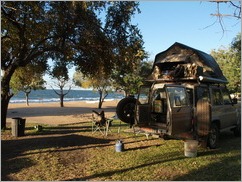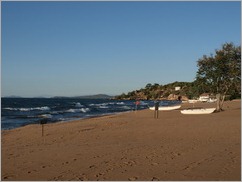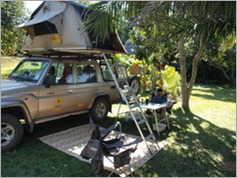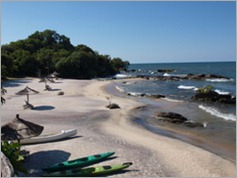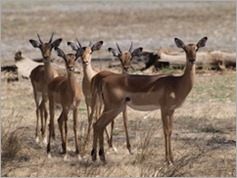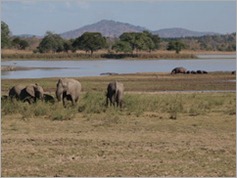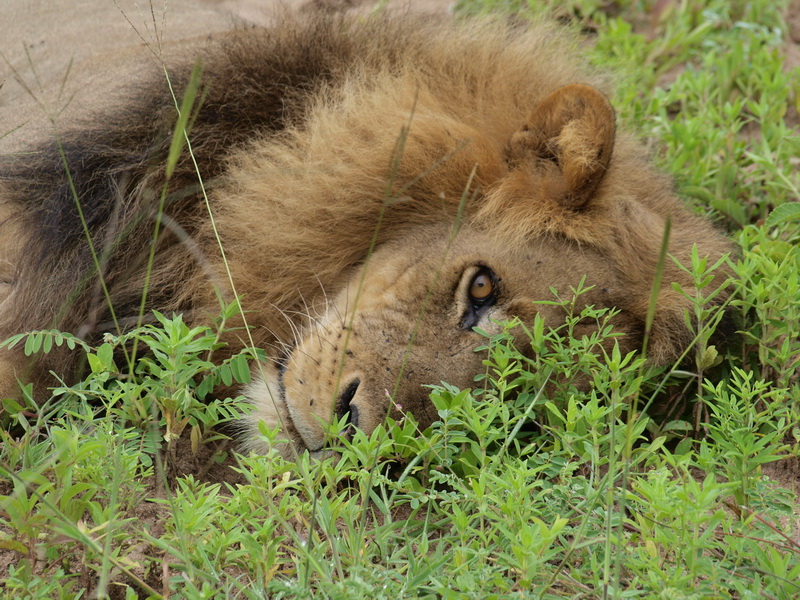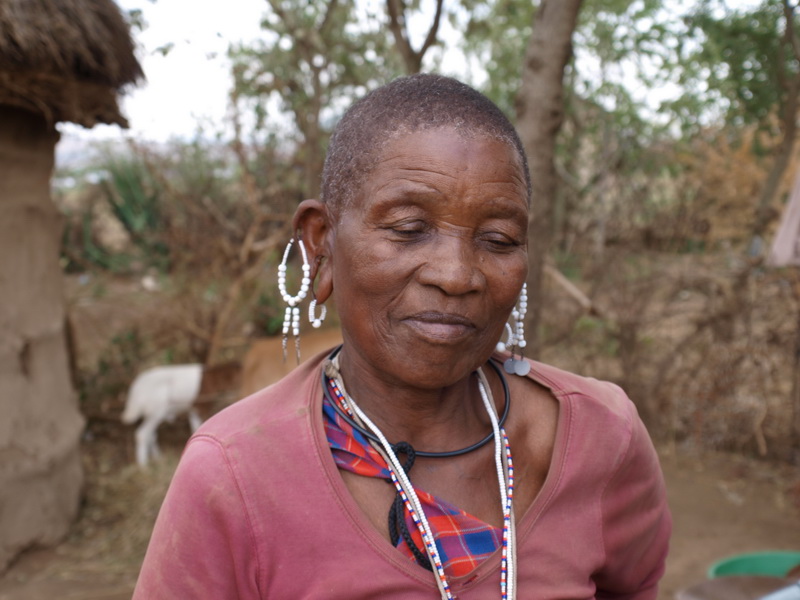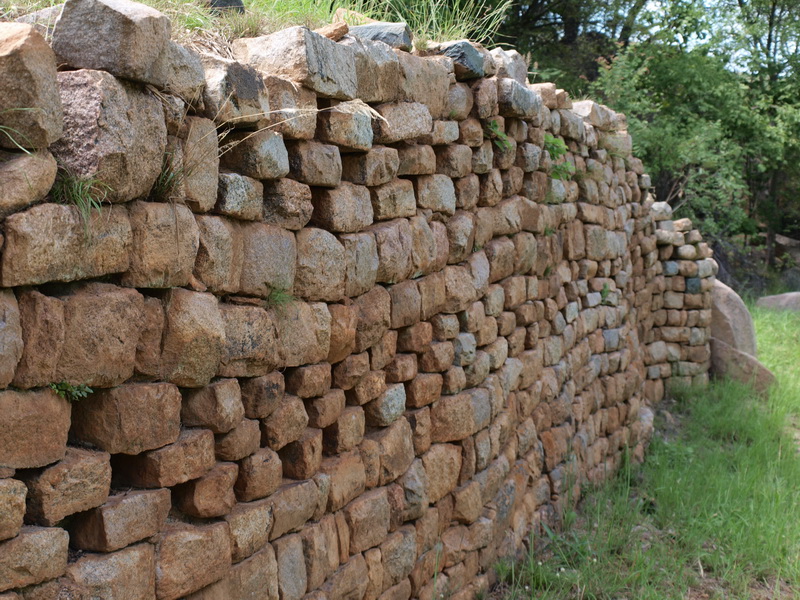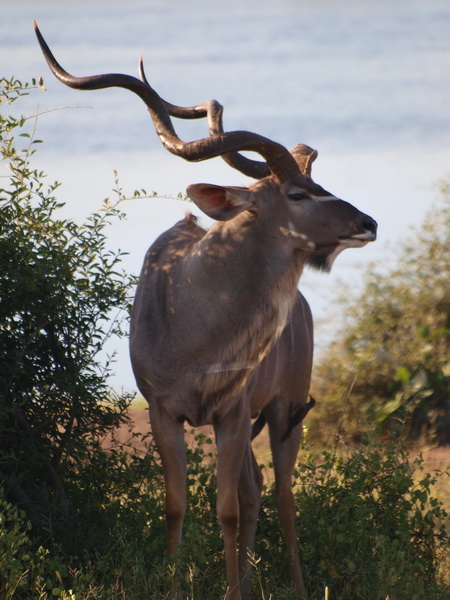 From Liwonde we took a reasonably short drive to Cape Maclear at the very south of Lake Malawi. The last bit of the road in takes you over some mountains and eventually you wind your way through a village where at times there was barely enough room for our car to fit through. I am very glad we had our GPS as it would have been a bit of a challenge finding the campsites without it.
From Liwonde we took a reasonably short drive to Cape Maclear at the very south of Lake Malawi. The last bit of the road in takes you over some mountains and eventually you wind your way through a village where at times there was barely enough room for our car to fit through. I am very glad we had our GPS as it would have been a bit of a challenge finding the campsites without it.
We stayed at Fat Monkeys for 2 nights for 500 Kw ($3.30) each per night. Our car was parked about 5 metres 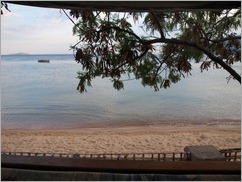 from the waters edge where we sat and watched the locals going about their business.(The picture shows the view from our tent). Some of the locals would stop for a chat and there was the inevitable attempt by some to sell you something, but there was no pressure and they were all very pleasant. From the comfort of my chair I organised some fish for dinner as well as some potatoes, tomatoes, lettuce, carrots and bread (yes I had to barter with them to pay a reasonable price, but it sure beats going shopping). On our way here we also purchased a 1.5m x 2.5m reed mat for the grand total of 700 Kw ($4.60). It was the woman’s starting price and we couldn’t bring ourselves to barter for it. Goodness knows how long it took her to make it, but she seemed quite happy to have sold it.
from the waters edge where we sat and watched the locals going about their business.(The picture shows the view from our tent). Some of the locals would stop for a chat and there was the inevitable attempt by some to sell you something, but there was no pressure and they were all very pleasant. From the comfort of my chair I organised some fish for dinner as well as some potatoes, tomatoes, lettuce, carrots and bread (yes I had to barter with them to pay a reasonable price, but it sure beats going shopping). On our way here we also purchased a 1.5m x 2.5m reed mat for the grand total of 700 Kw ($4.60). It was the woman’s starting price and we couldn’t bring ourselves to barter for it. Goodness knows how long it took her to make it, but she seemed quite happy to have sold it.
 Fat Monkeys has a nice, reasonably priced restaurant and bar which we took advantage of the first night. The amenities are clean and the water is hot. The first really hot, full
Fat Monkeys has a nice, reasonably priced restaurant and bar which we took advantage of the first night. The amenities are clean and the water is hot. The first really hot, full pressure shower we have had in a while. The camping area is small so I can imagine it would get pretty crowded during their peak season, but at this time of year it was perfect. They also have excellent security. Reception sells the treatment for Bilharzia at a cost of 200 Kw per tablet (you need 1 tablet per 15kg of body weight) which is significantly cheaper than it would be at home, so we bought enough to treat ourselves once we leave the infected areas.
pressure shower we have had in a while. The camping area is small so I can imagine it would get pretty crowded during their peak season, but at this time of year it was perfect. They also have excellent security. Reception sells the treatment for Bilharzia at a cost of 200 Kw per tablet (you need 1 tablet per 15kg of body weight) which is significantly cheaper than it would be at home, so we bought enough to treat ourselves once we leave the infected areas.
We took a wander through the village and everyone was very friendly, waving and saying hello. The kids as usual wanted to have their photos taken so they could see themselves on the camera. The village is mainly a fishing village that also caters for the tourists with boat trips and basic accommodation. The lake is used for everything, from recreation to fishing, to bathing and laundry, yet the water is still really clear. It was a perfect spot to relax for a few days.






